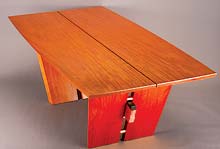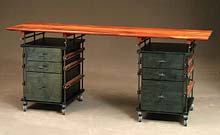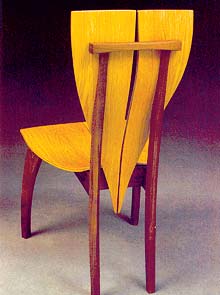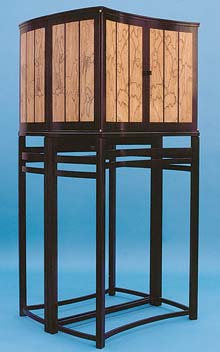If you build it, they will come—or so hopes HandMade in America’s Jenny Moore. The associate director of the Western North Carolina nonprofit, which promotes area culture, crafts and crafters, Moore says there’s a mixture of artistic styles in the mountains. Some artists are doing very traditional work, while others focus on contemporary styles.

“Asheville is open to an eclectic mix of furniture,” Moore notes. Which is why she’s banking on the area becoming a destination for lovers of handmade furniture.
Making the journey to WNC to buy furnishings is not a new concept. The Encyclopedia of North Carolina points out, “Furniture has been an important product of North Carolina artisans and manufacturers since the early colonial era. The massive success of the industry in the state led to North Carolina’s acquiring the nickname ‘Furniture Capital of the World’ during the 1980s, when the state produced approximately one-half of the furniture sold in the United States.” North Carolina brands like Thomasville, Broyhill and Henredon were industry heavyweights.
But after that flush of success, the manufactured-furniture trade began to diminish as overseas markets churned out cheaper products. Today, few Tar Heel factories remain in business. It’s a sad story, but there’s a silver lining: As mass producers fall by the wayside, small studios and individual woodworkers are stepping up to replenish the WNC furniture market with unique, high-end bench-made pieces that are equally at home in the living room and gallery.
A bit of history: When the Grove Park Inn was being constructed early last century, manager Fred Seeley made a point to add handcrafted touches to the property. A supporter of the Arts and Crafts Movement (an aesthetic-driven reaction to the machine-made products popularized by the Industrial Revolution), Seeley commissioned craftsman-style chairs and lighting fixtures from the famed Roycrofter studios of East Aurora, N.Y. When it came to appointing the guest rooms, the Inn turned to North Carolina’s White Furniture Company for the sturdy oak pieces that can still be see in Grove Park’s original building.

That dedication to craftsmanship and handmade products—an aesthetic echoed in Asheville’s many Arts and Crafts-era bungalows, often furnished in that iconic style—laid the groundwork for the Arts & Crafts Conference, the annual sold-out event held at the Grove Park Inn, now in its 21st year.
And such evidence of a long-term country-wide love affair with craftsman design makes it that much more exciting to note that the Roycroft Campus, located near Buffalo, N.Y., now offers artisan classes. Craftspeople whose work passes the scrutiny of a jury are awarded the use of the double-R stamp associated with the original Roycroft studios. One such artist, Greg Paolini, recently relocated to Asheville and is marketing his traditional Arts and Crafts furniture through the Grovewood Gallery.
But the return to bench-made furniture doesn’t necessarily mean a return to antiquated styles. Up-and-coming designer Fatie Atkinson, whose work is also on display at Grovewood Gallery, recently re-envisioned an Adirondack chair—that classic lawn lounger—by steam-bending wood in a jig. He then used a Roycroft technique of ammonia steaming to accomplish a coloring effect.
The end result? An architectural creation both familiar and modern, much like all of Atkinson’s designs. His deceptively simple tuxedo chair, a creation Grovewood Gallery’s Furniture Director Carla Filippelli deems “sexy,” won first place in the furniture category of the prestigious NICHE Awards in 2006.
“It’s based on the form of the human body with three curves,” explains Atkinson, a graduate of Haywood Community College’s Professional Crafts Program in woodworking. He explains that the chair is made of bend laminate, inspiring his latest idea: to incorporate laminate with steam bending.

But, he adds, “Sometimes customers look at the tuxedo chair and say, ‘That’s boring’” due to the simple, local woods he uses. “What I’m trying to sell you is a style rather than a flair of finishes and exotic woods.”
The return to studio-made furniture seems to be accompanied by an increased awareness on the part of many consumers of where wood comes from. Endangered exotics, once highly desirable, are now shunned in favor of responsibly obtained domestic species.
“Many builders make it a real selling point for their woods to come out of respected markets,” Filippelli says. Woodworker John McDermott goes a step further, building his contemporary designs from reclaimed materials. He’s constantly on the lookout for trees downed by storms. “It’s the right thing to do,” he maintains. “And it’s very rewarding because you get some very nice wood. I’m a quarter-sawn addict, and you can’t buy it.”
Similarly, local furniture maker Ed Decker uses walnut from fields that are about to be cleared. “Treecycling” businesses are popping up, and sawmills such as Full Cycle Woodworks in eastern Tennessee advertise “sustainable lumber.”
So, with harvesting practices improving, galleries at the ready and a growing base of artisans crafting fine furniture, how exactly does North Carolina reinstate itself as a furniture destination? According to Filippelli, it’s a matter of educating the customer.
“We get more of a knowledgeable buyer,” she says. “When people think they can’t afford [an item], I try to take the fear factor out by explaining that many pieces here are comparable in price to a finer Ethan Allen store. And it’s all American-made, solid hardwoods, and adding to the local economy.”
McDermott adds, “It’s a good investment in the sense that the work is somewhat timeless and it’s better quality. Most mass-produced work is in particle board.” His favorite woods to use include cherry and local hickory.

“People look at the furniture thing as unique,” he continues. “Most of it is one of a kind. People like the individuality, having a houseful of things their neighbors don’t have.”
Though the woodworker feels that his contemporary, streamlined style is sometimes out of sync with Asheville’s penchant for Arts and Crafts items, he’s also aware that big-box retailer IKEA is filling a niche with the modern-design pieces favored by the growing U.S. urban population. He speculates it make take time for other areas to catch up since “people may not understand what they like and are scared to do anything out of the ordinary.” But McDermott points out that decorating style, on the whole, is moving away from clichéd matching suites.
Plus, contemporary decor store Mobilia is holding its own in downtown Asheville, and modern, urban-flavored condos (no doubt in need of tables, chairs and sideboards) continue to be constructed.
The Grovewood Gallery’s entire second floor is dedicated to furniture, much of it very modern, thanks to the influence of art-furniture innovators George Nakashima, Sam Maloof and James Krenov. But pieces made by WNC’s designers also carry a distinct sense of the mountains that birthed the wood, the craft and an appreciation for handmade products.
As Atkinson puts it, “I may not be creating a new Appalachian style, but I’m definitely in the fold.”
And HandMade in America is doing its best to promote that fold. The organization has two printed source books with 69 artists from WNC representing architecture and another 123 artists involved with freestanding crafts. There’s also a searchable online resource called “Handcrafted Design Source” (handmadeinamerica.org/designsource/index.php) representing about 100 artists—the same number that is involved with the HandMade house in Biltmore Forest community The Ramble.
“We’re seeing an interest on the part of architects, homeowners and interior designers, as well as on the part of artists, and we’re trying to pull them together,” Moore says.
The associate director points to trend indicators such as the handmade furniture section in this year’s Architectural Digest Home Design Show in New York City, and a recent handcraft show in a Florida gallery.
“It’s percolating all over the place,” she enthuses. And, because the area’s attraction isn’t just the crafts of the past, “We’re hoping to do a furniture conference here that will draw people from all over the country. I really think it’s a niche for WNC because we have so many high-end designers.”



Before you comment
The comments section is here to provide a platform for civil dialogue on the issues we face together as a local community. Xpress is committed to offering this platform for all voices, but when the tone of the discussion gets nasty or strays off topic, we believe many people choose not to participate. Xpress editors are determined to moderate comments to ensure a constructive interchange is maintained. All comments judged not to be in keeping with the spirit of civil discourse will be removed and repeat violators will be banned. See here for our terms of service. Thank you for being part of this effort to promote respectful discussion.